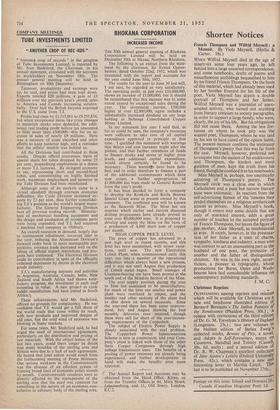Shorter Notices
WHEN Wilfrid Meynell died at the age of ninety-six some four years ago, he left
behind him a large unsorted correspondence, and some notebooks, drafts of poems and miscellaneous scribblings bequeathed to him by his friend Francis Thompson. On the basis of this material, which had already been used by her brother Everard for his life of the poet, Viola Meynell has drawn a double portrait of Thompson and her father. Wilfrid Meynell was a journalist of unex- ampled activity, who turned out anything from literary criticism to society paragraphs, in order to support a large family, who were, clearly, the joy of his life. But his obligations did not cease there. Among the less for- tunate on whom he took pity was the wastrel poet, Thompson, whom he was said by his son to have cured of the opium habit. The present memoir confirms the testimony of Thompson's poetry that this was far from the case. Meynell, however, preferred not to enquire into the success of his endeavours; and Thompson, the kindest and most guileless of men, kept the .truth from his friend, though he confided it to his notebooks.
Miss Meynell is, perhaps, too uncritically admiring of Thompson's poetry. The Meynell circle was a close one in which Catholicism and a pure but narrow literary taste were axiomatic. In reaction from the self-advertising licence of the 'nineties they prided themselves on a religious aestheticism almost as private. Miss Meynell's book, though it enters into some details that are only of restricted interest, adds a great number of touches to the accepted portrait of Francis Thompson, but leaves the figurcof her mother, Alice Meynell, as insubstantial as ever. It excels, however, in the presenta- tion of her father as a man of charm, sympathy, kindness and industry, a man who was content to act an unassuming part as the husband of one poet, the protector of another and the father of distinguished children. He was in his own right, never- theless, a pioneer in typography, whose productions for Burns, Oates and Wash- bourne have had considerable influence on contemporary publishing standards.
J. M. C.










































































 Previous page
Previous page